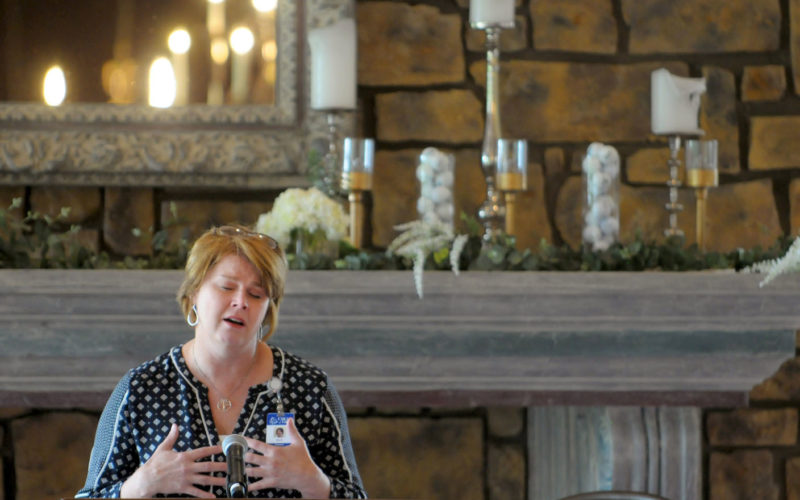Patients hesitate to enter hospice, neglect benefits
ANDREA JOHNSON
ajohnson@nwadg.com
Laney Morriss knew at about age 44 where she wanted to die, her sister said.
If possible, Morriss wanted to die in a hospice inpatient home, but neither she nor her family expected that would happen just three years later, her sister Shana Clark, of Springdale, said.
Morriss made her decision before being diagnosed with a rare form of ovarian cancer, Clark said. Morriss was a healthy police captain at Springdale’s Police Department who realized everyone must face death, and she wanted some control over hers. Dying under hospice care meant Morriss should live her last days with minimal suffering.
Morriss’ outlook on hospice care differed from most people who don’t consider it an option until their last days, Clark said, speaking from her experience as an intensive care unit nurse.
Hospice care focuses on palliative or comfort care rather than curing an illness for patients with a life expectancy of six months or less, according to Medicare. Northwest Arkansas has four Medicare-approved agencies with offices in Washington or Benton counties: Arkansas Hospice, Circle of Life Hospice, Washington Regional Hospice and Hospice of North Arkansas.
Despite a growth in awareness and resources, many eligible patients aren’t taking full advantage of hospice benefits, said Catherine Grubbs, CEO of Circle of Life Hospice. Officials said terminally ill patients often suffer longer under intensive curative treatments when they resist transitioning to comfort care.
A state report indicated Washington and Benton counties need more hospice beds to meet the projected need of patients this year, but Northwest Arkansas providers say they have never turned a patient away because of a lack of resources.
Medicare or Medicaid pays for qualifying patients’ hospice care related to their terminal illness for six months or as long as a doctor certifies they are terminally ill, according to Medicare. Medicare paid $16.9 billion for hospice care in 2016, according to the most recent National Hospice and Palliative Care Organization annual report. The American Hospice Foundation reports most patients have their costs covered by Medicare.
Arkansas Hospice, Circle of Life and Washington Regional Hospice provide financial support for patients who cannot pay for necessary care, officials said.
More than half of Medicare hospice patients in 2016 were enrolled for 30 days or less, according to the organization’s annual report. Arkansas patients using Medicare benefits spent less time in hospice care on average than others around the country. Arkansas patients spent an average 61 days compared with 70 days nationwide, according to the Centers for Medicare and Medicaid Services.
“We so often hear ‘I wish we had started hospice sooner,’” Grubbs said. “We’re encouraging people to have those conversations sooner rather than later.”
Multiple factors play into a decision to enroll. Doctors might hesitate to refer their patients if recovery is possible, and families and patients fear giving up too soon, officials said.

The Free Weekly/CHARLIE KAIJO
Nancy Desler, marketing and communications manager, smoothes a hospice bed at the Circle of Life Hospice Home at Legacy Village in Bentonville. A state report indicated Washington and Benton counties need more hospice beds to meet the projected need of patients this year, but Northwest Arkansas providers say they have never turned a patient away because of a lack of resources.

The Free Weekly/DAVID GOTTSCHALK
Dee Vaughn (center) visits with Kathy McClure (left) and Connie Gayer at the beginning of the Circle of Life Hospice’s Ladies Auxiliary luncheon at Pinnacle Country Club in Rogers.
Terminal Prognosis
Medical professionals are typically more accurate in giving a prognosis, or probable outcome of an illness, when time is short, said Megan Davis, a supportive care physician at Highlands Oncology Group in Fayetteville and Rogers. A physician might wait to refer their patient to hospice care if the prognosis is questionable, which could be a reason most people enroll later.
It’s a common misconception hospice equates to giving up, Grubbs said. She explains it as a shift in focus.
“It’s a shift to ‘I want to have a high quality of life. I want to feel good. I want to enjoy the last weeks or months that I have to the best of my ability,’” Grubbs said.
Clark thinks her sister had a unique perspective on hospice care because Morriss had spent time with a friend’s mother in Circle of Life hospice home in Springdale, she said. Morriss was impressed with the care and shared her own wishes with family before receiving her cancer diagnosis in 2007. She spent about two weeks in Circle of Life’s care before she died in 2009.
Clark doesn’t remember noticing signs of suffering until Morriss’ last few weeks, she said. She thinks Morriss waited to seek comfort care because of her age.
“Most of those two years she was able to rebound from her chemotherapy,” Clark said. “Young people tend to fight a little bit longer, I guess, than people who are 80 or 85.”
Circle of Life served 1,555 patients in Benton, Washington, Carroll and Madison counties in 2017 — 66 percent of which were 75 or older, according to the agency’s annual report. Cancer made up 32 percent of terminal diagnosis with stroke and pulmonary or lung-related diagnoses being the next most prevalent.
The terminal diagnosis from Morriss’ doctor confirmed her situation was unlikely to improve and influenced her decision to stop curative treatment, Clark said.
Choosing to enter a hospice program means choosing care for comfort instead of continuing curative care, according to Medicare. If a patient age 65 or older accepts Medicare hospice benefits, Medicare will no longer cover treatment meant to cure an illness.
Patients may decline hospice care at any time. “They’re not signing their life away” when they choose hospice care, David Edwards, strategic communications and media manager for Arkansas Hospice and the Arkansas Hospice Foundation, said. Care providers rarely discharge living patients, but it does happen.
The ability to offer pediatric patients hospice care concurrently with curative care makes the hospice conversation slightly easier for those patients and their family, said Sheri Bishop, an Arkansas Hospice pediatric nurse. Adults can get concurrent palliative and curative care but not within a hospice program, Edwards said.
Arkansas Hospice opened an office in Rogers this year but doesn’t have an inpatient facility in Northwest Arkansas, so care for patients must take be in a home setting. Parents who meet with Bishop likely have watched their child endure months of intensive treatment in a hospital, making in-home comfort care more appealing, she said.
“They want little Johnny at home with the siblings and the dog and the cat. They don’t want to be in the hospital,” Bishop said.

The Free Weekly/CHARLIE KAIJO
Registered nurse Judy Sumrall takes a phone call while working on charts at the Circle of Life Hospice Home at Legacy Village in Bentonville. Despite a growth in awareness and resources, many eligible patients aren’t taking full advantage of hospice benefits, says Catherine Grubbs, CEO of Circle of Life Hospice.

The Free Weekly/CHARLIE KAIJO
Karem Grumme-Rodriguez (from right), in-patient social worker, and Judy Sumrall talk to Gary Oehlert of Bella Vista at the Circle of Life Hospice Home at Legacy Village in Bentonville. More than half of Medicare hospice patients in 2016 were enrolled for 30 days or less, according to the organization’s annual report.
Limited Time
Davis said when a patient’s life is ending, the patient’s goals become her priority. If the patient’s goal is to live as long as possible, hospice isn’t a good fit. If their priority is comfort and a better quality of life, hospice is ideal.
“People are most satisfied with hospice services when their philosophy and goal are in line with that hospice philosophy,” Davis said.
Some patients want to check activities off their bucket list, and hospice can allow that, she said.
Circle of Life’s Ladies Auxiliary group was founded in 2014 for that reason, Chief Development Officer Dee Vaughn said. The group of hospice supporters raise money and work with social workers and chaplains to recognize needs and help grant patients’ last wishes. The group has helped a New York Yankees fan see a baseball game, a grandmother attend her granddaughter’s wedding and a woman walk on the beach one last time.
“That goes back to, if we have time to spend with you and to get to know you and your family, we can make those things happen,” Vaughn said.
Family members are always invited into the hospice experience, Edwards said. Hospice agencies involve teams of doctors, nurses, certified nurse assistants, social workers, pharmacists and chaplains to provide levels of care during the patient’s treatment and bereavement services to help families cope with death.
Bella Vista resident Amy Gillespie has heard positive testimonies about Circle of Life, and she wants her father to experience comfort in his last days, she said. She has watched his health decline, in part because of brain surgery complications, for about a year in a Bella Vista nursing home.
His feeding tube is his lifeline, and he would qualify for hospice care if he chooses to stop using it, Gillespie said.
“It’s him deciding to end his life. That’s a big decision,” she said. “If it were me and I could think clearly, I would want to go ahead and say goodbye, but it’s not me. It’s him, and he’s a fighter. He wants to see the grandkids grow up.”
Her father could receive hospice care in the nursing home, Gillespie said. The majority of hospice care takes place in a home setting, which includes private residences and nursing facilities, according to the National Hospice organization. Patients who were enrolled in Medicare who died in a nursing facility made up 32.8 percent of hospice deaths in 2016, and deaths at home made up 44.6 percent, according to the organization’s annual report.
The Arkansas Health Service Permit Agency estimates 30 percent of deaths each year will occur under hospice care. Based on each county’s four-year average death count, the agency has projected 537 people in Benton County and 472 in Washington County will become potential hospice patients this year.
The Arkansas agency publishes quarterly reports assessing need in the state and hasn’t determined a need for a new hospice agency or facility as of July, according to the report. The report shows a need for 46 more hospice beds in Benton County and 25 more in Washington County.
Arkansas Hospice has been working from offices and inpatient facilities across the state for 26 years and began serving patients out of its Rogers office in February, Edwards said. Edwards hopes adding another resource in the area will lead to more people using hospice care in Northwest Arkansas.
“We see the growth in Northwest Arkansas,” Edwards said. “We also recognize the need that, even if there was not growth, we see the need for more people to enter hospice care sooner rather than later.”
Planning Ahead
Fayetteville area resident Daniel Martin remembers his parents as pragmatic people who were willing to enter hospice care when their conditions allowed it, he said. Both died in Washington Regional Hospice care.
His father spent nearly four months receiving care in his home after a terminal melanoma cancer diagnosis in 2010, and his mother, who had Alzheimer’s and Parkinson’s diseases, died in a nursing home in 2017 after about a year of hospice care, he said. His parents received satisfactory care, and he felt some relief knowing they had made end-of-life care plans.
Martin’s parents had completed advance medical directives or living wills providing the family and caregivers with instruction for how they wanted to be treated, he said. The Arkansas Department of Health provides health care decision forms, which were adopted by the Board of Health in October 2013, on its website.
Gov. Asa Hutchinson signed Act 504 in March 2017 to allow use of the Physician Order for Life Sustaining Treatment form in Arkansas. This form doesn’t replace a living will or advance directive but can supplement one by converting intentions regarding life-sustaining treatment into a medical order, according to the act.
Washington Regional Hospice is putting together a program to implement the form within the health system, said Jennifer Neumann, director of hospice and palliative care services at the Willard Walker Hospice Home. Physicians should assist patients who have potentially serious health problems in filling out the form if they choose to complete it.
“It’s really helping to empower the patient to be able to say what they want and acknowledge that they have an illness that might lead to an emergency-type situation,” Neumann said.
Circle of Life officials recommend the Five Wishes living will booklet, which they offer for free upon request, Vaughn said. Vaughn has completed the booklet with her 21-year-old daughter, so she will know what to do if her mother were unable to communicate in her last days.
“It doesn’t matter how old you are. Everyone should have that conversation today with their loved ones,” Vaughn said.
Neumann said later enrollment to hospice services could be a positive sign that doctors and technology are doing a better job of managing symptoms of terminal illness, she said. She hopes death becomes “less taboo in our culture” so people will reach out and seek options before their last days.


__
FYI
Hospice in Northwest Arkansas
• Washington Regional Medical Center established the state’s first Medicare-certified hospice in the early 1980s and accepted its first patient in 1985. Circle of Life Hospice emerged in 1992 and built a hospice facility, the Earlene Howard Hospice Home in Springdale, in 2006 with 16 beds then added eight more beds in 2009. Washington Regional Hospice opened its inpatient home, the Willard Walker Hospice Home in Fayetteville, in 2011 with 12 beds.
• Circle of Life opened Hospice Home at Legacy Village in Bentonville, the first hospice facility in Benton County and third in Northwest Arkansas, in 2013 with 16 beds. Circle of Life also added eight beds to the Bentonville home, bringing the area’s total bed count to 60.
• Hospice of North Arkansas opened its area office, which serves patients in other locations such as nursing facilities or residential homes, in 2010-waiting for confirmation in Springdale. Arkansas Hospice opened the newest area office in Rogers with a ribbon-cutting in June but served its first patients in February.
— Source: Staff report






